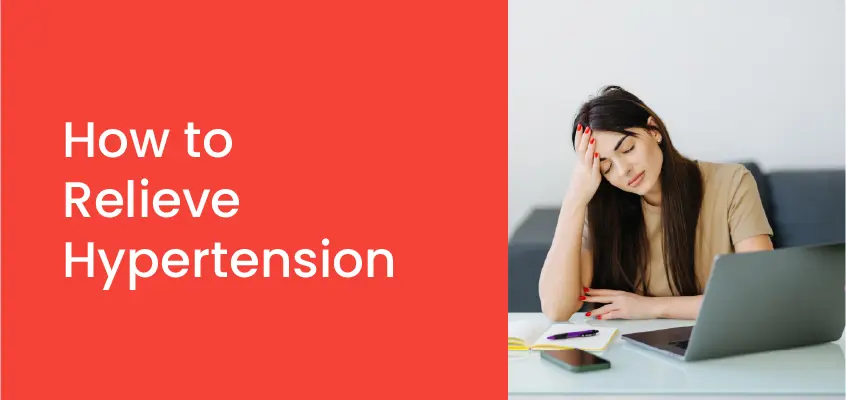Introduction
Hypertension or high blood pressure is a condition in which the pressure in the blood vessels is elevated. It is a common condition where blood pressure stays at 140/90 mmHg or higher. High blood pressure may not cause any symptoms, but if you want to avoid complications, you must control it. This blog post will help you understand what hypertension is, what causes it, and how to handle it.
What is hypertension?
Hypertension, also known as high blood pressure, is a condition in which the force of the blood pumped through arteries is too high for the arterial walls. This can lead to serious health problems, including heart disease, stroke and kidney failure. High blood pressure can affect anyone, but it is more common in adults over 60.
Hypertension is a leading cause of death around the globe, and in fact, the World Heart Federation estimates that hypertension is the number one risk factor for death globally. That is why it is essential to know hypertension’s signs and symptoms and get treated if you have it.
You can do a few things to help prevent hypertension, including eating a healthy diet, maintaining a healthy weight and exercising regularly. If you already have hypertension, there are treatments available that can help to control it.
Symptoms of hypertension
Common symptoms of hypertension include:
- Frequent headaches
- Increased heart rate
- Nosebleeds
- Fatigue
- Nausea
- Muscle tremors
- Confusion
- Anxiety
- Chest pain
- Vision changes.
Causes of hypertension
The top causes of hypertension include diabetes, genetic factors, stress, pregnancy, being overweight, lack of exercise, sleep apnea and anxiety. Here are some of the other factors that can lead to increased blood pressure in adults:
- Diabetes: According to studies, a diabetic person is twice more likely to have elevated blood pressure than a non-diabetic person.
- Obesity: Carrying around too much body fat causes the body to produce extra hormones that can lead to hypertension.
- Too much sodium in diet: An excess of sodium in the diet can cause the body to retain fluid and raise blood pressure.
- Lack of sleep: A lack of sleep can raise blood pressure and increase the risk of hypertension.
- Lack of exercise: Being sedentary can increase the risk of hypertension.
- Drinking too much alcohol: Excessive alcohol consumption can cause narrower blood vessels, increasing the risk of blood pressure.
- Stress hormones: High levels of the hormone cortisol can raise blood pressure.
- Genetics: Some cases of hypertension are caused due to genetic predisposition.
- Medications: Excessive use of certain painkillers and anti-inflammatory drugs can cause blood pressure to spike.
How to reduce your hypertension
If you or your loved one has been diagnosed with hypertension, you may wonder how to lower your blood pressure. While medication can be an essential part of treatment, you can also make lifestyle changes to help reduce your hypertension. Here are seven tips to help reduce hypertension in adults:
1. Eat a healthy diet
Eating a healthy diet is one of the best things you can do to help reduce hypertension. Aim for a diet low in salt and fat and rich in fresh fruits and vegetables.
2. Get regular exercise
Regular exercise is another critical factor in reducing hypertension. Just 30 minutes of moderate exercise most days of the week can help lower your blood pressure.
3. Lose weight if you are overweight
Losing even a few pounds can help reduce your blood pressure if you are overweight.
4. Quit smoking
Smoking is a significant risk factor for hypertension. If you smoke, quitting is one of the best things you can do for your blood pressure.
5. Limit your alcohol intake
Drinking alcohol in moderation can help reduce hypertension, but excessive alcohol consumption can increase blood pressure.
6. Reduce stress
High levels of stress can lead to hypertension. If you are under a lot of pressure, try to find ways to manage it better. Meditation, yoga and deep breathing exercises can all help reduce stress levels.
7. Get enough sleep
Poor sleep can contribute to hypertension. Aim for 7-8 hours of sleep each night. These lifestyle changes can help reduce your risk of hypertension and improve your overall health.
Treatment of hypertension
The first step in managing hypertension is to make lifestyle changes and then use medications as a backup. By making various lifestyle changes, such as developing healthy eating habits, losing weight, and maintaining a daily exercise plan, you can reduce your blood pressure to desirable levels.
The treatment of hypertension depends on the severity of the blood pressure, the person’s risk of complications and certain other diseases. The main medications used to treat hypertension are angiotensin-converting enzyme (ACE) inhibitors and angiotensin receptor blockers (ARBs). These drugs reduce the workload on the heart, thereby reducing blood pressure.
Other medications, such as beta-blockers, may be prescribed if the lifestyle changes and medications do not work well enough to control blood pressure. Combining several different drugs can get blood pressure to normal levels in many patients.
Conclusion
Hypertension is one of the leading causes of death around the globe, but the good news is that it is a preventable condition. You can do many things to lower your blood pressure, such as eating a healthy diet, exercising regularly, and avoiding tobacco use.
If you are concerned about your blood pressure, it’s always a good idea to talk to your doctor; they can help you create a treatment plan that is right for you. You can reduce the risks of developing severe health problems by controlling your blood pressure.









